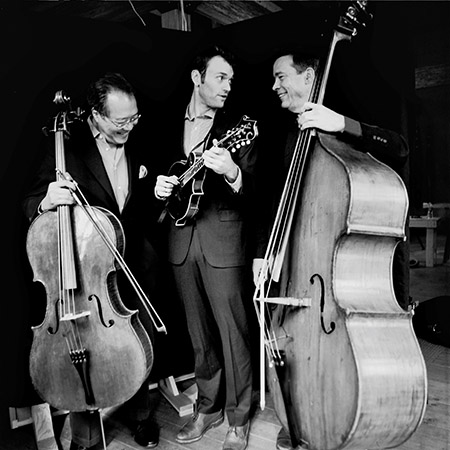Bach in Boston: Ma, Thile, and Meyer prove a unified and delightful trio
Yo-Yo Ma, Chris Thile, and Edgar Meyer walk many paths. Each musician is a virtuoso of the highest caliber and performs a wide range of classical repertoire. Yet each frequently delves into music outside the classical mainstream. Thile, a mandolinist, is also a performer of bluegrass music. Meyer, the bassist, dabbles in jazz and rock. And Ma, the famed cellist, explores the broad styles of both the Eastern and Western world with his Silk Road Ensemble.
The three musicians have individually explored the music of Bach, and it is with that composer’s music where the three have recently come together. Their new album, entitled “The Bach Trios,” features the performers in transcriptions of sonatas, chorale preludes, and fugues. Friday night at Symphony Hall, this unusual trio teamed up to play music drawn largely from that recording.
With musicians of this caliber, technique is never an issue. But the most remarkable aspect of their ensemble is unity and blend. Thile’s mandolin frequently took place of the harpsichord in the trio sonatas, filling out the texture with trickling lines. Ma’s cello was thoroughly song-like, and Meyer’s bass supplied a groundwork that, in parts, was more felt that heard.
The musicians were also capable of changing colors on a dime. In Bach’s Trio Sonata No. 6 in G, Ma’s cello sounded with a bright glow. The work’s second movement was a study in pizzicato, with Thile and Meyer performing a cascade of figures. Ma’s cello soared overhead, his tone taking on a silvery quality.
The spotlight fell upon Ma in the Viola da Gamba Sonata No. 3 in G minor. His playing was nimble and elegant as he passed running passages to Thile in the first movement. The second movement unfolded in free-moving phrases, while the third movement glided as if a dance.
In other works the musicians were equal partners. The Prelude and Fugue in E minor, BWV 548 featured the musicians spinning a thick web of sound. Grace and delicacy, though, marked each individual line. The Prelude No. 19 in A major from the Well-Tempered Clavier had a singing quality, a fine contrast with the ensuing Fugue No. 20 in A minor from the same work, a piece of sharp edges and shimmering tone. Ma, Thile, and Meyer punched out the pointillistic theme with vigor.
Two selections from The Art of the Fugue featured yet another shade of color. Fugue No. 8 unwound in dolorous lines, and Ma and Meyer’s tone shifted smoothly from shining gold to thin silver in the fugue and its inversion of No. 13.
But it was in the evening’s chorale preludes where the musicians truly found the tender emotionalism of this music. Their arrangement of Wachet Auf, Ruft uns die Stimme was one that unfolded in lyrical arcs. Ma’s cello took over the tenor line from the famous chorale setting while Thile deftly handled the trickling string part. Meyer’s bass, all the while, supplied the anchor. In Ich Ruf Zu Dir, Jesu Christ the musicians played with a quiet presence. Kommst Du Nun was a twirling dance of the spirit. Erbarm dich mein, O Herre Gott provided the most musical event of the evening. Thile, playing guitar, laid down a steady stream of chords with Meyer’s bass tethering them to the ground. Ma’s cello line seemed to soar in phrases that were transfixing. That, indeed, is the power of Bach when played by world-class musicians.
Warm applause brought the trio back onstage for two encores. The first, Quarter Chicken Dark from their album “Goat Rodeo Sessions” moved in a sturdy, bluesy groove. The second returned to Bach as the musicians offered a silky performance of the Passepied from the Keyboard Partita No. 5 in G major.
The next classical music event sponsored by the Celebrity Series will feature soprano Natalie Dessay and pianist Philippe Cassard in songs that explore the lives of women 8 p.m. April 29 at Jordan Hall. Celebrityseries.org; 617- 482-6661.
